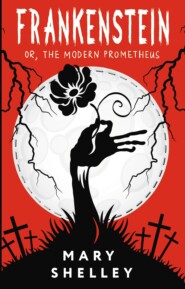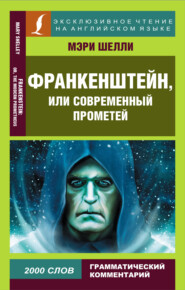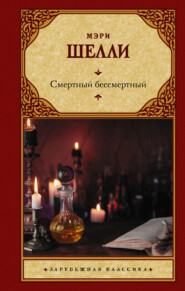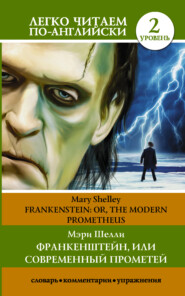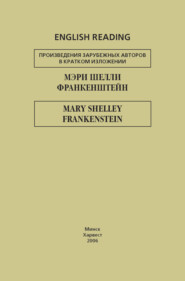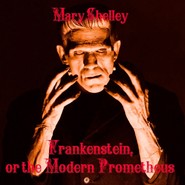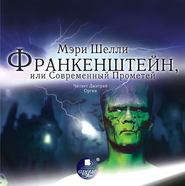По всем вопросам обращайтесь на: info@litportal.ru
(©) 2003-2024.
✖
Mathilda
Настройки чтения
Размер шрифта
Высота строк
Поля
70
Not in F of F – A. The quotation should read:
Fam. Whisper it, sister! so and so!
In a dark hint, soft and slow.
71
In F of F – A this account of her plans is addressed to Diotima, and Mathilda's excuse for not detailing them is that they are too trivial to interest spirits no longer on earth; this is the only intrusion of the framework into Mathilda's narrative in The Fields of Fancy. Mathilda's refusal to recount her stratagems, though the omission is a welcome one to the reader, may represent the flagging of Mary's invention. Similarly in Frankenstein she offers excuses for not explaining how the Monster was brought to life. The entire passage, "Alas! I even now … remain unfinished. I was," is on a slip of paper pasted on the page.
72
The comparison to a Hermitess and the wearing of the "fanciful nunlike dress" are appropriate though melodramatic. They appear only in Mathilda. Mathilda refers to her "whimsical nunlike habit" again after she meets Woodville (see page 60) and tells us in a deleted passage that it was "a close nunlike gown of black silk."
73
Cf. Shelley, Prometheus Unbound, I, 48: "the wingless, crawling hours." This phrase ("my part in submitting … minutes") and the remainder of the paragraph are an elaboration of the simple phrase in F of F – A, "my part in enduring it – ," with its ambiguous pronoun. The last page of Chapter VIII shows many corrections, even in the MS of Mathilda. It is another passage that Mary seems to have written in some agitation of spirit. Cf. note 26.
74
In F of F – A there are several false starts before this sentence. The name there is Welford; on the next page it becomes Lovel, which is thereafter used throughout The Fields of Fancy and appears twice, probably inadvertently, in Mathilda, where it is crossed out. In a few of the S-R fr it is Herbert. In Mathilda it is at first Herbert, which is used until after the rewritten conclusion (see note 83) but is corrected throughout to Woodville. On the final pages Woodville alone is used. (It is interesting, though not particularly significant, that one of the minor characters in Lamb's John Woodvil is named Lovel. Such mellifluous names rolled easily from the pens of all the romantic writers.) This, her first portrait of Shelley in fiction, gave Mary considerable trouble: revisions from the rough drafts are numerous. The passage on Woodville's endowment by fortune, for example, is much more concise and effective than that in S-R fr. Also Mary curbed somewhat the extravagance of her praise of Woodville, omitting such hyperboles as "When he appeared a new sun seemed to rise on the day & he had all the benignity of the dispensor of light," and "he seemed to come as the God of the world."
75
This passage beginning "his station was too high" is not in F of F – A.
76
This passage beginning "He was a believer in the divinity of genius" is not in F of F – A. Cf. the discussion of genius in "Giovanni Villani" (Mary Shelley's essay in The Liberal, No. IV, 1823), including the sentence: "The fixed stars appear to abberate [sic]; but it is we that move, not they." It is tempting to conclude that this is a quotation or echo of something which Shelley said, perhaps in conversation with Byron. I have not found it in any of his published writings.
77
Is this wishful thinking about Shelley's poetry? It is well known that a year later Mary remonstrated with Shelley about The Witch of Atlas, desiring, as she said in her 1839 note, "that Shelley should increase his popularity… It was not only that I wished him to acquire popularity as redounding to his fame; but I believed that he would obtain a greater mastery over his own powers, and greater happiness in his mind, if public applause crowned his endeavours… Even now I believe that I was in the right." Shelley's response is in the six introductory stanzas of the poem.
78
The preceding paragraphs about Elinor and Woodville are the result of considerable revision for the better of F of F – A and S-R fr. Mary scored out a paragraph describing Elinor, thus getting rid of several clichés ("fortune had smiled on her," "a favourite of fortune," "turning tears of misery to those of joy"); she omitted a clause which offered a weak motivation of Elinor's father's will (the possibility of her marrying, while hardly more than a child, one of her guardian's sons); she curtailed the extravagance of a rhapsody on the perfect happiness which Woodville and Elinor would have enjoyed.
79
The death scene is elaborated from F of F – A and made more melodramatic by the addition of Woodville's plea and of his vigil by the death-bed.
80
F of F – A ends here and F of F – B resumes.
81
A similar passage about Mathilda's fears is cancelled in F of F – B but it appears in revised form in S-R fr. There is also among these fragments a long passage, not used in Mathilda, identifying Woodville as someone she had met in London. Mary was wise to discard it for the sake of her story. But the first part of it is interesting for its correspondence with fact: "I knew him when I first went to London with my father he was in the height of his glory & happiness – Elinor was living & in her life he lived – I did not know her but he had been introduced to my father & had once or twice visited us – I had then gazed with wonder on his beauty & listened to him with delight – " Shelley had visited Godwin more than "once or twice" while Harriet was still living, and Mary had seen him. Of course she had seen Harriet too, in 1812, when she came with Shelley to call on Godwin. Elinor and Harriet, however, are completely unlike.
82
Here and on many succeeding pages, where Mathilda records the words and opinions of Woodville, it is possible to hear the voice of Shelley. This paragraph, which is much expanded from F of F – B, may be compared with the discussion of good and evil in Julian and Maddalo and with Prometheus Unbound and A Defence of Poetry.
83
In the revision of this passage Mathilda's sense of her pollution is intensified; for example, by addition of "infamy and guilt was mingled with my portion."
84
Some phrases of self-criticism are added in this paragraph.
85
In F of F – B this quotation is used in the laudanum scene, just before Level's (Woodville's) long speech of dissuasion.
86
The passage "air, & to suffer … my compassionate friend" is on a slip of paper pasted across the page.
87
This phrase sustains the metaphor better than that in F of F – B: "puts in a word."
88
This entire paragraph is added to F of F – B; it is in rough draft in S-R fr.
89
This is changed in the MS of Mathilda from "a violent thunderstorm." Evidently Mary decided to avoid using another thunderstorm at a crisis in the story.
90
The passage "It is true … I will" is on a slip of paper pasted across the page.
91
In the revision from F of F – B the style of this whole episode becomes more concise and specific.
92
An improvement over the awkward phrasing in F of F – B: "a friend who will not repulse my request that he would accompany me."
93
Spencer's Faery Queen Book 1 – Canto [9]
Not in F of F – A. The quotation should read:
Fam. Whisper it, sister! so and so!
In a dark hint, soft and slow.
71
In F of F – A this account of her plans is addressed to Diotima, and Mathilda's excuse for not detailing them is that they are too trivial to interest spirits no longer on earth; this is the only intrusion of the framework into Mathilda's narrative in The Fields of Fancy. Mathilda's refusal to recount her stratagems, though the omission is a welcome one to the reader, may represent the flagging of Mary's invention. Similarly in Frankenstein she offers excuses for not explaining how the Monster was brought to life. The entire passage, "Alas! I even now … remain unfinished. I was," is on a slip of paper pasted on the page.
72
The comparison to a Hermitess and the wearing of the "fanciful nunlike dress" are appropriate though melodramatic. They appear only in Mathilda. Mathilda refers to her "whimsical nunlike habit" again after she meets Woodville (see page 60) and tells us in a deleted passage that it was "a close nunlike gown of black silk."
73
Cf. Shelley, Prometheus Unbound, I, 48: "the wingless, crawling hours." This phrase ("my part in submitting … minutes") and the remainder of the paragraph are an elaboration of the simple phrase in F of F – A, "my part in enduring it – ," with its ambiguous pronoun. The last page of Chapter VIII shows many corrections, even in the MS of Mathilda. It is another passage that Mary seems to have written in some agitation of spirit. Cf. note 26.
74
In F of F – A there are several false starts before this sentence. The name there is Welford; on the next page it becomes Lovel, which is thereafter used throughout The Fields of Fancy and appears twice, probably inadvertently, in Mathilda, where it is crossed out. In a few of the S-R fr it is Herbert. In Mathilda it is at first Herbert, which is used until after the rewritten conclusion (see note 83) but is corrected throughout to Woodville. On the final pages Woodville alone is used. (It is interesting, though not particularly significant, that one of the minor characters in Lamb's John Woodvil is named Lovel. Such mellifluous names rolled easily from the pens of all the romantic writers.) This, her first portrait of Shelley in fiction, gave Mary considerable trouble: revisions from the rough drafts are numerous. The passage on Woodville's endowment by fortune, for example, is much more concise and effective than that in S-R fr. Also Mary curbed somewhat the extravagance of her praise of Woodville, omitting such hyperboles as "When he appeared a new sun seemed to rise on the day & he had all the benignity of the dispensor of light," and "he seemed to come as the God of the world."
75
This passage beginning "his station was too high" is not in F of F – A.
76
This passage beginning "He was a believer in the divinity of genius" is not in F of F – A. Cf. the discussion of genius in "Giovanni Villani" (Mary Shelley's essay in The Liberal, No. IV, 1823), including the sentence: "The fixed stars appear to abberate [sic]; but it is we that move, not they." It is tempting to conclude that this is a quotation or echo of something which Shelley said, perhaps in conversation with Byron. I have not found it in any of his published writings.
77
Is this wishful thinking about Shelley's poetry? It is well known that a year later Mary remonstrated with Shelley about The Witch of Atlas, desiring, as she said in her 1839 note, "that Shelley should increase his popularity… It was not only that I wished him to acquire popularity as redounding to his fame; but I believed that he would obtain a greater mastery over his own powers, and greater happiness in his mind, if public applause crowned his endeavours… Even now I believe that I was in the right." Shelley's response is in the six introductory stanzas of the poem.
78
The preceding paragraphs about Elinor and Woodville are the result of considerable revision for the better of F of F – A and S-R fr. Mary scored out a paragraph describing Elinor, thus getting rid of several clichés ("fortune had smiled on her," "a favourite of fortune," "turning tears of misery to those of joy"); she omitted a clause which offered a weak motivation of Elinor's father's will (the possibility of her marrying, while hardly more than a child, one of her guardian's sons); she curtailed the extravagance of a rhapsody on the perfect happiness which Woodville and Elinor would have enjoyed.
79
The death scene is elaborated from F of F – A and made more melodramatic by the addition of Woodville's plea and of his vigil by the death-bed.
80
F of F – A ends here and F of F – B resumes.
81
A similar passage about Mathilda's fears is cancelled in F of F – B but it appears in revised form in S-R fr. There is also among these fragments a long passage, not used in Mathilda, identifying Woodville as someone she had met in London. Mary was wise to discard it for the sake of her story. But the first part of it is interesting for its correspondence with fact: "I knew him when I first went to London with my father he was in the height of his glory & happiness – Elinor was living & in her life he lived – I did not know her but he had been introduced to my father & had once or twice visited us – I had then gazed with wonder on his beauty & listened to him with delight – " Shelley had visited Godwin more than "once or twice" while Harriet was still living, and Mary had seen him. Of course she had seen Harriet too, in 1812, when she came with Shelley to call on Godwin. Elinor and Harriet, however, are completely unlike.
82
Here and on many succeeding pages, where Mathilda records the words and opinions of Woodville, it is possible to hear the voice of Shelley. This paragraph, which is much expanded from F of F – B, may be compared with the discussion of good and evil in Julian and Maddalo and with Prometheus Unbound and A Defence of Poetry.
83
In the revision of this passage Mathilda's sense of her pollution is intensified; for example, by addition of "infamy and guilt was mingled with my portion."
84
Some phrases of self-criticism are added in this paragraph.
85
In F of F – B this quotation is used in the laudanum scene, just before Level's (Woodville's) long speech of dissuasion.
86
The passage "air, & to suffer … my compassionate friend" is on a slip of paper pasted across the page.
87
This phrase sustains the metaphor better than that in F of F – B: "puts in a word."
88
This entire paragraph is added to F of F – B; it is in rough draft in S-R fr.
89
This is changed in the MS of Mathilda from "a violent thunderstorm." Evidently Mary decided to avoid using another thunderstorm at a crisis in the story.
90
The passage "It is true … I will" is on a slip of paper pasted across the page.
91
In the revision from F of F – B the style of this whole episode becomes more concise and specific.
92
An improvement over the awkward phrasing in F of F – B: "a friend who will not repulse my request that he would accompany me."
93
Spencer's Faery Queen Book 1 – Canto [9]






